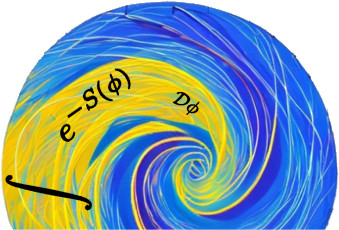*The application deadline has passed for both this Trimester Program and the School. To see the future trimester programs, please click here.*

Quantum field theories (QFTs) have been successfully applied, throughout the last 70 years, to model and analyze diverse physical phenomena; in particular, critical behavior in statistical mechanics, and interactions of fundamental particles. However, a rigorous mathematical framework to construct and understand these theories is still limited. This program will further pursue this direction, building on recent developments towards QFT coming from random geometry and probability theory. In particular, the goal is to bring together researchers with different viewpoints and expertise on this multifaceted topic.
With this combined expertise, the program aims at addressing some of the main challenges and key open questions in the field, including in the following areas:
- advances in quantum gauge theories in 3D and 4D
- rigorous constructions of exactly solvable quantum field theories, especially in 2D
- more generally, analysis of probabilistic aspects of quantum field theories
- the theory of phase transitions, in particular for systems with continuous symmetry, and related phenomena
Link to Trimester Program website
Scientific Organizers:
- Roland Bauerschmidt (Courant Institute of Mathematical Sciences)
- Eveliina Peltola (University of Bonn & Aalto University)
- Ellen Powell (Durham University)
- Rémi Rhodes (Aix Marseille University)
- Eero Saksman (University of Helsinki)
Trimester Program Events:
Each week of the Trimester Program includes numerous activities, such as a seminar series, lecture series, reading courses and so on. In addition, there are some major events, three workshops and one summer school. The workshops are aimed at people who are participants in the Trimester Program at that time. It is not possible to apply only for these workshops. The Summer School is aimed at early-career researchers, especially PhD students and postdocs. There is a separate application platform for this event, which can be found on the School's event page.
- Summer School "Probabilistic methods in quantum field theory" (May 12-16, 2025)
- Workshop: "Random geometry and its connections to QFT" (May 19-23, 2025)
- Workshop: "Integrable QFT: conformal bootstrap, bosonization, near-critical perturbations, and Coulomb gas" (June 23-27, 2025)
-
Workshop: "Gauge theories and spin systems: Yang-Mills theory, continuous symmetry, and disorder" (July 28- August 1, 2025)
In addition to the program events above, the following seminars will take place:
- Research Seminar Series (Organizers: Irene Ayuso Ventura, Leandrp Chiarini)
- Junior Research Seminar Series (Organizers: Harini Desiraju, Sid Maibach, Léonie Papon)